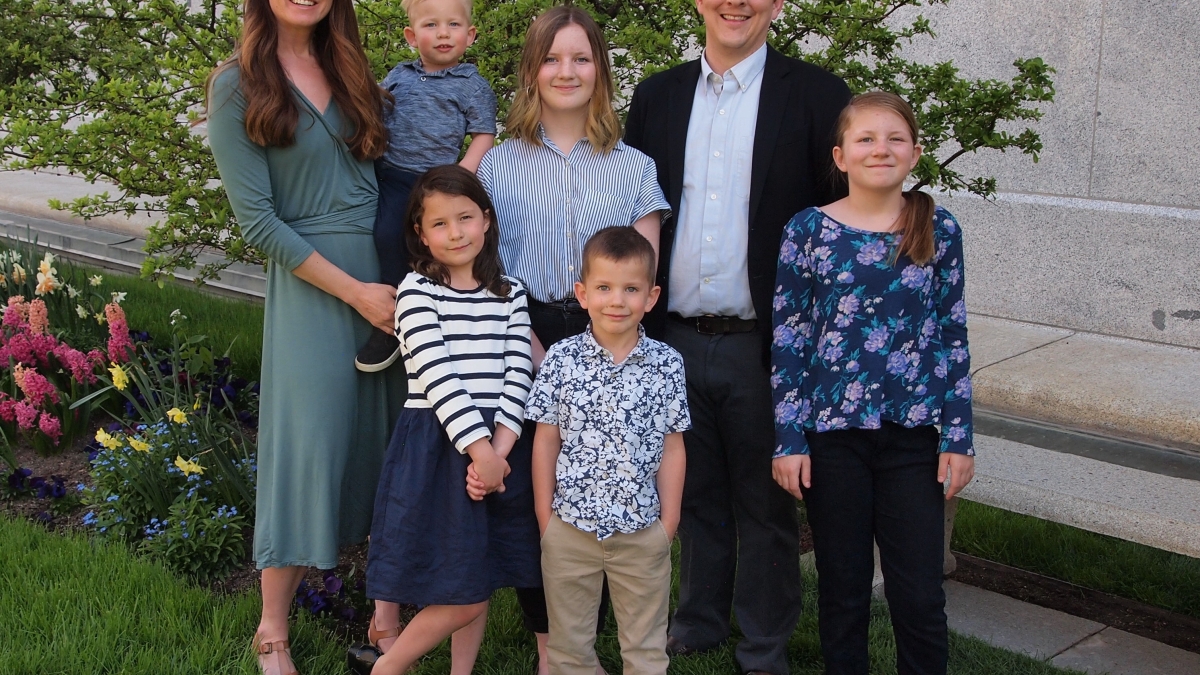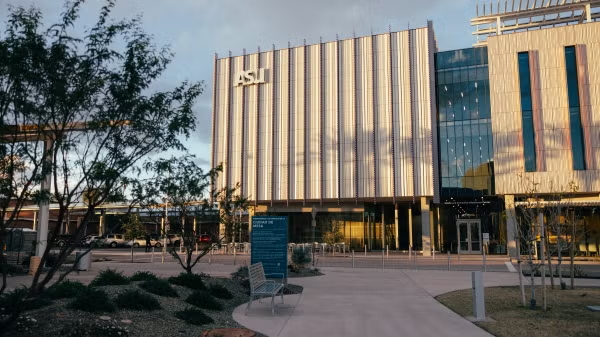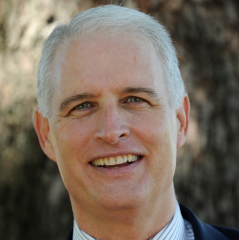3 mothers and classmates wrap up work on their online master’s degrees

Jacquelynn Sokol (left) with her husband, Jeff, and their five children. Sokol and two other mothers of five were in the same online capstone class in nonprofit leadership and management this spring, earning their master's degrees from ASU.
To make the grade and get the degree, every college student has some hills to climb that aren’t detailed in a syllabus. They’re the nonacademic challenges that can be just as imposing as any stack of papers, projects or exams.
At least the stars aligned this spring so that Jessica Cooper, Sara Ebert and Jacquelynn Sokol could meet and share their unique circumstances when they enrolled in the same online capstone class at Arizona State University.
They were all near the end of their journeys toward a Master of Nonprofit Leadership and Management degree from the School of Community Resources and Development. Two received their degrees May 11, with Sokol having one last class to go.
Above the pressures most any graduate student must face, they share a rare common experience. The day before commencement, each one celebrated Mother’s Day as the mother of five children.
Five children, all with requests, many at inopportune times — as in, when assignments were due.
Each mom, a professional seeking to augment her career, was completing all that classwork while still having most or all of her kids living at home with her. Two of them had all five.
And although all three live in the same metropolitan area around Salt Lake City, they had not met before enrolling in their master’s degree program.
Throw in the unique hurdles this spring of each being sheltered at home with their families during the COVID-19 pandemic (fortunately, none of the three moms has had anyone sick with the virus) and dealing with a 5.7 magnitude earthquake that struck near Salt Lake City two months ago. All these things, and graduate studies, too.
“They’re just warriors the way they navigated all of the disruption,” said Professor Robert Ashcraft. “The earthquake posed even more obstacles such as lost electric power, which is obviously a problem when pursuing online education. They demonstrated remarkable resilience, getting their assignments in and performing well throughout the semester.”
Professor Robert Ashcraft taught a graduate capstone class in nonprofit leadership and management in spring 2020 that was attended and completed by three mothers, each of whom has five children.
Ashcraft calls them inspirational. But each woman describes herself as someone ready to further her career who just happens to be the mother of five, and maybe might serve to inspire those children, particularly the girls.
One reason to succeed: Inspire my children
Ebert said she wanted to inspire her daughters.
“My youngest was in kindergarten so I decided to get my feet wet,” said Ebert, an administrative director with a nonprofit foundation. “Four of (my children) are girls, they’re getting to the age of deciding what to do. There’s a lot rhetoric about women’s roles out there. They saw Mom at home all the time. I wanted to show them that it was important to me to be their mom, but it was important also to keep learning and growing. It’s not one or the other.”
Sokol said her story is similar.
“My first three (children) are girls,” said Sokol, whose children, ages 2, 5, 8, 10 and 13, are the youngest group of the three. “My youngest is in diapers. I was nursing a newborn when I started. I wanted my daughters to see me walk (at commencement). My sons are going to have no memory of me going to school. But my daughters have seen Mom with the laptop, going to the library. They’ve seen me do the work.”
Cooper, who is formerly from Scottsdale, Arizona, with an undergraduate degree from ASU, is an event coordinator for a nonprofit and a board member of two others.
“I wanted the flexibility of an online program,” she said. “Being able to have the flexibility and not having to go someplace (for graduate school).” Despite taking courses from home, Cooper, a member of the executive team of a nonprofit organization, said that there were still plenty of sleepless nights.
“It is still a very large commitment of time. You want a lot out of the program, you have to put a lot into it,” said Cooper, whose children are ages 7, 9, 16, 21 and 26.
Cooper said her children often tried to get her attention, asking her to watch something they’re enjoying on TV, for example. But she said she had to tell them she couldn’t because she had schoolwork to do.
“We’re fighting over technology,” Cooper said. “It was easier when they were at school. Now we all see what it’s like to be online and all need Wi-Fi.”
Sokol said after her husband completed a three-year night-school Master of Public Administration program at nearby Brigham Young University, she wanted to be able to go to a campus herself, as she liked social interaction.
“But I loved this program,” Sokol said. “ASU was the right fit. It was really doable and affordable. It was just the right program and has been a really good program. I’m impressed with the course topics and what I’ve learned.”
Midnight master’s degree
So, what was this spring semester like?
“This time period has been crazy between being stuck at home (due to) COVID-19 and the earthquakes,” said Ebert, whose kids’ ages are 7, 10, 13, 17 and 20. “Every time the ground shakes I’m buying more water.”
The capstone class has been challenging, both inside and outside the virtual classroom, she said.
“Everything seems to have hit. It’s been a work-life-home balance, an interesting time to slow down and focus on a capstone. I would say it is so different than my undergraduate study course was,” Ebert said. “But I could not have done this program any other way. I never could have done it (in person).”
Ebert calls the program her “midnight master’s,” because much of her best work was accomplished between 10 p.m. and 2 a.m.
“Where else but online can you do that? Everyone’s winding up. Everyone’s had something happen in their lives and now are wrapping it up,” she said.
Sokol also remembered some midnights.
“There are so many nights. For me, school doesn’t start until 8 or 8:30 at night, once the kids were in bed. I’d go to the library and at 8:55 the (library) ladies would give me the stink eye,” Sokol said. “They were closing it down and looked worried that I wouldn’t leave.”
Public places to study ceased to be an option when shelter-in-place rules went into effect in March, and Salt Lake City’s climate meant it was too cold in March to work outside, Sokol said.
Priorities and commiserating
Cooper said she frequently worked on school assignments inside her car while doing typical parent things such as waiting for her daughter to get out of ballet.
Cooper also moved during the semester, but school priorities came first, and many boxes are still unopened.
“The boxes can wait until the second week of May,” she said.
There wasn’t much time or opportunity to share advice on parenting, although the three remember commiserating about classwork, just like many students.
“There’d be a late-night email: ‘Did you read that assignment? Are you ready to drop out?’” Ebert said with a laugh.
Last year school was canceled for a snow day.
“We thought it was worst thing ever. One day was a real pain then,” Cooper said. “Now, it’s three months.”
Sokol said she is still amazed of the “random and crazy” situation that put three women, all from the Salt Lake City area, and all three mothers of five, in the same small class of a total of 15 students.
“There is something really great about having people who are just like you working toward the same goal,” Sokol said. “Our lives are similar, there is that unity and understanding.”
Beyond that, she said, was the opportunity to get to know others in their graduate degree program who were from much farther away, whose midnights came earlier or later.
“There were other moms in my classes with newborns; we have kind of connected. People living in different countries. One guy was doing some sort of military operation with an undisclosed location,” Sokol said. “They’ve all had different life stories. One thing I’ve loved, is the diversity in my classes, but a lot of people with commonalities.”
Doubts, sorrows, but ultimately, perseverance
Ebert said that she and her fellow mothers proved that they could get those degrees, but that didn’t mean that at times there weren’t doubts.
“As time goes on, you say, 'I can’t do it. This is the one thing that has to give,'” Ebert said. “But your family says, 'You can do it, keep doing it.' My dad died in October. I had a paper due the night of his viewing. The funeral was the next day.”
Ebert would sit up many nights with her mother, who was dying herself, until her mother fell asleep. She typed papers while her mother was sleeping, until her mother passed away a few weeks later.
The advice for others from these mothers with 15 children between them could be summed up in a few words: "Do it. It’ll be tough, but worth it."
“I love being a later-adult-learner. I care about the material. I went back to school to learn, not just to get a degree,” Ebert said. “Dive in. Enjoy the material. It’s a different experience.”
Sokol agreed, “You have to make it a priority to invest in yourself, because when you do something for yourself, all other things on your plate will just work themselves out,” she said. “You’ll be a more whole person to show up in those other areas. A lot of times I haven’t been the best mom. But I am showing my kids a better mom for investing in in myself.”
Cooper says one of her children is a college senior.
“She’s ready to be done. For her to think of going back to school is absurd to her. I said I wanted to, I wanted to do something for myself,” Cooper said. “I wanted to be a lifelong learner. You get out of it what you put into it. Pick things out and apply them.”
More Arts, humanities and education

Exceeding great expectations in downtown Mesa
Anyone visiting downtown Mesa over the past couple of years has a lot to rave about: The bevy of restaurants, unique local shops…

Upcoming exhibition brings experimental art and more to the West Valley campus
Ask Tra Bouscaren how he got into art and his answer is simple.“Art saved my life when I was 19,” he says. “I was in a…

ASU professor, alum named Yamaha '40 Under 40' outstanding music educators
A music career conference that connects college students with such industry leaders as Timbaland. A K–12 program that…


